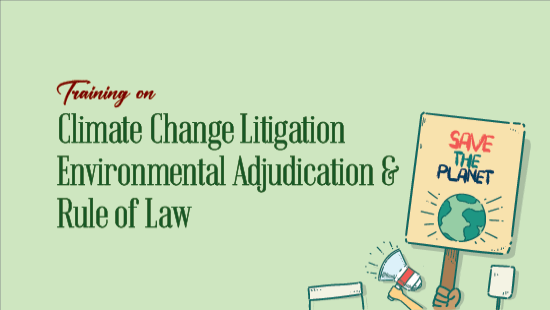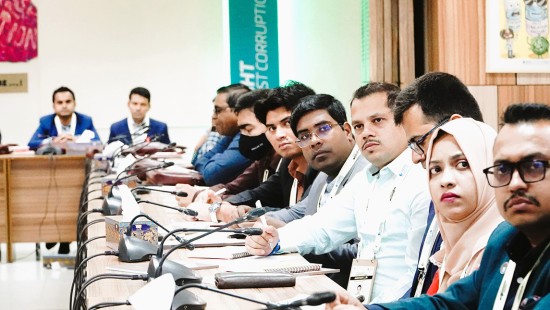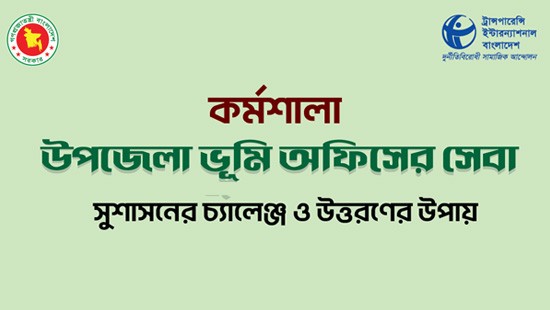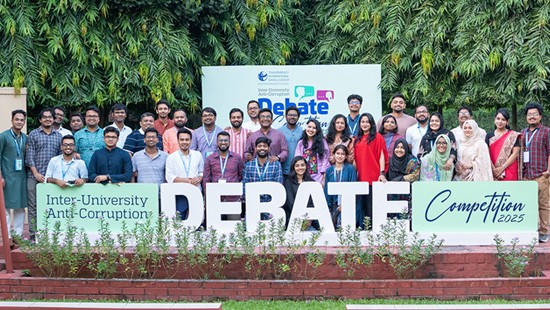Published: 09 November 2025
At the CCDB Hope Center in Savar, nearly hundred university students gathered for a debate competition and spent three days proving that the future of transparency in Bangladesh rests in passionate, uncompromising hands. The final motion hung in the air like a challenge: "This House believes that the expectation placed on the youth in preventing corruption is exaggerated."
For three days in early November, the CCDB Hope Center had echoed with the sharp crack of argument and counterargument. Now, in the final round of the Inter-University Anti-Corruption Debate Competition 2025, teams from Dhaka University Debating Society (DUDS) and Rajshahi University Debating Forum (RUDF) stood ready to settle the question that had animated every conversation, every meal, every late-night discussion in the dormitories that can the young generation will be able to change a system that seems immovable?
When the judges finally announced DUDS as champions, the applause was not just for victory. It was for something larger that a recognition that 96 students from across public and private universities had just spent three days doing what many said was impossible that making corruption uncomfortable to ignore!
A Movement Takes Root
The debate competition organized by the Transparency International Bangladesh (TIB) was not mere a youth activity but it gave students a structured platform to sharpen their arguments, test their convictions, and learn that fighting corruption requires more than passion which demands precision. The event continues annually, building a nationwide network of young people committed to transparency, accountability, and a corruption-free Bangladesh.
This year's competition, held from November 6 to 8, brought together 32 teams from 14 districts. Seventeen team came from outside Dhaka, traveling from Chittagong, Rajshahi, Barishal, Gopalganj, Rangpur, and beyond. Six institutions were competing for the first time, their debaters stepping into a tradition that has quickly become one of Bangladesh's most anticipated youth events. The residential format, three days of living and debating together, created something rare in Bangladeshi academia that rolled-out for a sustained focus! Total 87 parliamentary-style debates, each one a mini version of the larger contest for ensuring transparency and accountability.
More Than a Competition
Farim Ahsan of Jahangirnagar University earned the title of best debater overall, while Miftahul Jannat Rifat of Dhaka University claimed the same honor in the final round. But ask participants what they will remember most, and few mention about the trophies and crest that were handed over to them. "The residential format allowed us to fully focus with energy and dedication," one debater reflected, capturing a sentiment echoed throughout the closing ceremony. For many, it was their first experience of immersive learning and a chance to live and breathe the ideas they were arguing about.
The judges, too, played an unexpected role in transforming the event from competition to community. Fifty adjudicators from 17 institutions, including 16 women, were praised not just for their fair scoring but for creating an atmosphere of respect and support. In a country where debate competitions can sometimes feel cutthroat, this one felt different. Judges commended participants for going "beyond simply arguing to win," noting that the event provided "food for thought" rather than just points on a scorecard.
The Gender Equation
Every team included at least one female debater, except Dhaka College that resulting in 31 women among 96 total participants. It's a ratio that tells two stories: progress in women's participation in public discourse, and the distance still to cover! The presence of 16 female judges sent its own message. Young women watching from the audience could see themselves not just as participants but as authorities, decision-makers, mediators of intellectual care. In a society still negotiating women's roles in public life, these visual cues matter.
Why Debate Matters in the Fight Against Corruption
At the opening ceremony, Dr. Iftekharuzzaman, Executive Director of TIB, led the debaters, judges, and other participants in taking an anti-corruption oath, reaffirming their collective commitment to integrity. Later, in his closing remarks, he made a striking claim: "A true debater cannot engage in corruption." It's a bold statement, but his reasoning is compelling. Debate, he explained, teaches rational argument, mutual respect, and ethical reasoning—qualities fundamentally incompatible with corruption. When we are trained to consider multiple perspectives, to ground claims in evidence, and to respect an opponent’s humanity even while dismantling their argument, something shifts. Corruption becomes not just illegal but intellectually deceitful.
“Effective anti-corruption efforts require political will, fair investigation, institutional integrity, and active citizen engagement,” Dr. Iftekharuzzaman told the debaters. “If you have shaped historical movements, you can also play a pivotal role in building a transparent and accountable Bangladesh.”
The Real Prize
Mohammad Tauhidul Islam, Director of TIB's Outreach and Communication Division, offered a different kind of victory speech: "Winning is important, but the real value of debate lies in the learning it provides. It sharpens minds, broadens perspectives, and allows participants to grow intellectually. Everyone who took part in this competition is a winner."
Witnessing the participants' faces as they collect their certificates, exchange contact information, promise to stay in touch, we see the truth in his words. It was a room full of young people who have discovered the power of their own voices. These students spent three days discussing political reform, governance systems, institutional accountability.
Notably, the top eight teams have automatically qualified for next year's competition, ensuring continuity and raising the stakes. But the real continuation happens in dormitories and classrooms across Bangladesh, where participants will take these sharpened arguments and turn them on the corruption they encounter in daily life.






















